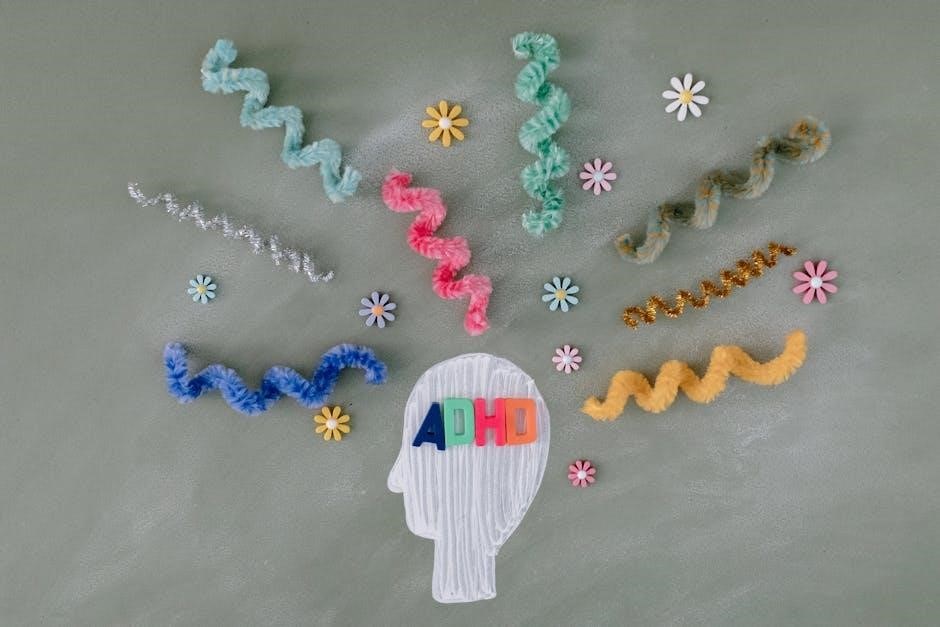Oppositional Defiant Disorder (ODD) is a disruptive behavior disorder marked by persistent anger‚ defiance‚ and disobedience toward authority figures․ Worksheets are valuable tools for managing ODD‚ offering structured activities to improve emotional regulation‚ problem-solving‚ and communication skills‚ while reinforcing positive behavior patterns and reducing conflicts․
1․1 Definition and Overview of ODD
Oppositional Defiant Disorder (ODD) is a disruptive behavior disorder marked by a persistent pattern of angry mood‚ defiant behavior‚ and vindictiveness lasting at least six months․ It is characterized by deliberate actions that challenge authority‚ such as arguing‚ refusing to comply with rules‚ and intentionally annoying others․ ODD often disrupts relationships and daily functioning‚ requiring structured interventions․ Worksheets are a practical tool for managing ODD‚ providing exercises to improve problem-solving‚ emotional regulation‚ and communication skills‚ while guiding positive behavioral changes and reducing conflict․
1․2 The Importance of Worksheets in Managing ODD
Worksheets play a crucial role in managing Oppositional Defiant Disorder (ODD) by providing structured activities that promote emotional regulation‚ problem-solving‚ and positive communication․ They offer a systematic approach to addressing defiant behaviors‚ helping individuals identify triggers and develop healthier coping strategies․ Worksheets are versatile‚ allowing customization to meet individual needs‚ and can be used consistently across therapy sessions and home environments․ They foster self-awareness‚ accountability‚ and skill development‚ making them an essential tool for reducing conflict and promoting long-term behavioral improvement in individuals with ODD․

Understanding Oppositional Defiant Disorder
Oppositional Defiant Disorder (ODD) is a disruptive behavior disorder characterized by persistent anger‚ defiance‚ and disobedience toward authority figures‚ lasting at least six months in children and adolescents․
2․1 Key Characteristics of ODD
Oppositional Defiant Disorder (ODD) is characterized by a persistent pattern of angry‚ argumentative‚ and defiant behavior․ Key traits include deliberately annoying or upsetting others‚ blaming others for mistakes‚ being easily annoyed‚ and displaying anger or resentment․ These behaviors must last at least six months and be inappropriate for the child’s age․ ODD often manifests through frequent arguments with authority figures‚ refusal to follow rules‚ and deliberate acts of provocation․ Such actions occur across multiple settings‚ like home and school‚ and significantly impair social and academic functioning․
2․2 Diagnostic Criteria for ODD
The diagnostic criteria for Oppositional Defiant Disorder (ODD) include a pattern of angry‚ argumentative‚ and defiant behavior lasting at least six months․ According to the DSM-5‚ individuals must exhibit at least four symptoms from the following categories: deliberately annoying others‚ blaming others for mistakes‚ being easily annoyed‚ and displaying angry or resentful behavior․ These behaviors must occur in multiple settings‚ such as home‚ school‚ or with peers‚ and must cause significant impairment in social‚ academic‚ or occupational functioning․ A comprehensive clinical assessment is required for an accurate diagnosis․
2․3 Common Symptoms and Behaviors Associated with ODD
Common symptoms of ODD include argumentativeness‚ defiance‚ and deliberate annoyance of others․ Individuals often display angry or irritable mood‚ blame others for their mistakes‚ and are easily annoyed․ They may also exhibit vindictive behavior‚ such as deliberately annoying others or spiteful actions․ These behaviors persist across multiple settings‚ such as home‚ school‚ or social interactions‚ and significantly impair social and academic functioning․ Recognizing these patterns is crucial for early intervention and effective management using tailored worksheets and therapeutic strategies․
The Role of Worksheets in Therapy and Home Use
Worksheets play a crucial role in managing ODD symptoms by providing structured activities for therapy and home use‚ helping individuals develop emotional regulation and positive behavior patterns effectively․
3․1 How Worksheets Aid in Therapy Sessions
Worksheets are instrumental in therapy for ODD‚ providing structured activities that help identify triggers and develop coping strategies․ They enable therapists to guide clients through problem-solving exercises‚ improving emotional regulation and communication skills․ By focusing on specific behaviors‚ worksheets facilitate personalized interventions‚ fostering accountability and progress tracking․ They also offer a systematic framework for exploring emotions and behaviors‚ making therapy sessions more effective and goal-oriented․
3․2 Using Worksheets at Home to Reinforce Positive Behavior
Worksheets are effective tools for reinforcing positive behavior at home‚ helping children with ODD generalize therapeutic gains․ Parents can use them to teach problem-solving‚ emotional regulation‚ and communication skills in daily routines․ Consistent use of worksheets fosters accountability and helps reduce conflict by providing structured activities․ They also offer parents a clear framework to model positive behaviors‚ creating a supportive environment for lasting change and improved family interactions․

Types of Worksheets for ODD
Various worksheet types address specific needs in managing ODD‚ including emotional regulation‚ behavior tracking‚ problem-solving‚ and communication skills․ These tools provide structured activities tailored to help individuals with ODD develop self-awareness‚ improve decision-making‚ and enhance interpersonal interactions․ Worksheets are designed to be engaging and practical‚ offering exercises that promote positive behavior and emotional control․ They serve as valuable resources for both home use and therapeutic settings‚ fostering consistent skill development and reinforcing adaptive behaviors․
4․1 Emotional Regulation Worksheets
Emotional regulation worksheets are designed to help individuals with ODD manage their feelings and reduce irritability․ These tools guide users in identifying triggers‚ exploring coping strategies‚ and practicing self-monitoring․ Activities often include exercises to recognize and label emotions‚ develop calming techniques‚ and reflect on the consequences of impulsive actions․ By enhancing self-awareness and teaching healthy emotional responses‚ these worksheets empower children and adolescents to navigate challenging situations more effectively‚ fostering a more stable and positive emotional state in daily life․ They are particularly beneficial for reducing anger and irritability‚ core symptoms of ODD‚ and can be used consistently at home or in therapy to reinforce progress․
4․2 Behavior Tracking and Monitoring Worksheets
Behavior tracking and monitoring worksheets are essential tools for managing ODD‚ helping individuals identify patterns in their actions and emotions․ These worksheets often include daily logs‚ behavior charts‚ and checklists to document instances of defiant or disruptive behavior․ By monitoring triggers and consequences‚ individuals can gain insight into their actions and develop strategies to improve self-control․ Regular use of these tools fosters accountability and encourages positive behavioral changes‚ making them a practical resource for both home and therapeutic settings to track progress over time effectively․
4․3 Problem-Solving and Decision-Making Worksheets
Problem-solving and decision-making worksheets are designed to help individuals with ODD develop critical thinking skills and manage conflicts effectively․ These tools guide users through identifying problems‚ evaluating options‚ and selecting appropriate solutions․ By practicing these skills‚ individuals can reduce impulsive decisions and defiant behaviors․ Worksheets often include scenarios or prompts that encourage constructive thinking‚ fostering better decision-making and emotional regulation․ They are particularly useful in therapy‚ allowing individuals to apply these strategies to real-life challenges and improve their ability to navigate difficult situations more effectively․
4․4 Communication Skills Development Worksheets
Communication skills development worksheets are essential for addressing the interpersonal challenges associated with ODD․ These tools focus on improving verbal and non-verbal communication‚ teaching active listening‚ and fostering respectful interactions․ Worksheets often include role-playing scenarios‚ emotion identification exercises‚ and strategies for expressing feelings appropriately․ By enhancing communication skills‚ individuals with ODD can reduce conflicts‚ build stronger relationships‚ and interact more positively with peers‚ family‚ and authority figures․ These activities are particularly effective when used consistently in both therapeutic and home environments․

Benefits of Using Worksheets for ODD Management
Worksheets enhance emotional regulation‚ improve problem-solving‚ and promote positive communication‚ reducing defiant behavior and fostering healthier interactions․ They provide structured tools for consistent skill development and behavior improvement․
5․1 Improving Emotional Awareness and Control
Worksheets for ODD help children identify and understand their emotions‚ reducing intense reactions․ They teach recognition of triggers and coping strategies‚ fostering self-regulation․ By practicing emotional awareness‚ kids learn to manage feelings like anger or frustration more effectively‚ leading to calmer responses․ These tools encourage reflection on emotional states and their impact‚ promoting better control and healthier emotional expression․ Regular use of such worksheets can enhance a child’s ability to navigate challenging situations with greater emotional stability and resilience․
5․2 Enhancing Problem-Solving Abilities
Worksheets for ODD are designed to improve problem-solving skills by guiding children through structured activities․ They help identify problems‚ brainstorm solutions‚ and evaluate outcomes‚ fostering critical thinking․ These tools encourage children to consider alternative actions and their consequences‚ promoting better decision-making․ By practicing problem-solving‚ kids develop the ability to approach challenges more effectively‚ reducing impulsive reactions and improving their capacity to manage conflicts and difficult situations in a constructive manner․
5․3 Promoting Positive Communication Patterns
Worksheets tailored for ODD focus on enhancing communication skills‚ teaching children to express emotions and needs effectively․ Activities encourage active listening‚ empathy‚ and respectful dialogue‚ helping reduce conflicts․ By practicing clear and calm communication‚ children learn to convey their feelings without aggression‚ fostering healthier relationships with peers and authority figures․ These tools empower kids to navigate social interactions more successfully‚ promoting a positive and collaborative environment at home and school․ Effective communication is key to reducing defiant behaviors and building strong‚ respectful connections․ Worksheets make this process engaging and accessible for children with ODD․
5․4 Reducing Conflict and Defiant Behavior
Worksheets designed for ODD help diminish conflicts by teaching children to recognize triggers and employ calming strategies․ Activities focus on problem-solving‚ self-regulation‚ and understanding consequences of actions․ By practicing these skills‚ children learn to respond to situations more thoughtfully‚ reducing impulsive and defiant reactions․ These tools guide kids to replace aggression with constructive behaviors‚ fostering a more peaceful environment and improving relationships with family and peers․ This structured approach helps minimize conflicts and promotes long-term behavioral change in individuals with ODD․

Creating Custom Worksheets for ODD
Custom worksheets for ODD are tailored to individual needs‚ incorporating visual aids and engaging activities to enhance learning and emotional regulation‚ ensuring age-appropriate design for effectiveness․
6․1 Tailoring Worksheets to Individual Needs
Tailoring worksheets to individual needs ensures they address specific challenges and abilities․ By assessing a child’s strengths and struggles‚ therapists and educators can create targeted activities that promote personal growth․ For example‚ a child with difficulty managing anger might benefit from emotion-regulation exercises‚ while another might focus on problem-solving tasks․ Personalized worksheets help maintain engagement and effectiveness‚ making them a powerful tool in managing ODD symptoms and fostering positive behavior․ This customization ensures the child receives relevant support‚ enhancing their therapeutic progress and daily functioning․
6․2 Incorporating Visual Aids and Engaging Activities
Incorporating visual aids and engaging activities into worksheets enhances their effectiveness for children with ODD․ Visual elements like images‚ charts‚ and puzzles can capture attention and simplify complex concepts․ Interactive activities‚ such as role-playing scenarios or problem-solving exercises‚ encourage active participation and practical application of skills․ These elements make worksheets more relatable and enjoyable‚ helping children stay focused and motivated․ By combining visual and interactive components‚ worksheets become a dynamic tool for teaching emotional regulation‚ communication‚ and problem-solving‚ tailored to a child’s unique learning style and interests․
6․3 Ensuring Age-Appropriateness in Worksheet Design
Ensuring age-appropriateness in worksheet design is crucial for effectively addressing ODD in children․ Worksheets should align with the child’s developmental level‚ incorporating activities that match their cognitive and emotional abilities․ For younger children‚ simpler tasks like identifying emotions through images or coloring exercises can be effective․ For older children‚ more complex problem-solving or reflective writing activities may be suitable․ Age-appropriate design ensures the child remains engaged and able to grasp concepts‚ making the worksheets more effective in promoting positive behavior and skill development․

Examples of Effective Worksheets for ODD
Effective worksheets for ODD include anger management exercises‚ social skills development activities‚ and cognitive-behavioral therapy (CBT) exercises․ These tools help children identify triggers‚ regulate emotions‚ and develop healthy communication patterns‚ while also providing parents and therapists with structured resources to promote positive behavior and reduce defiance․
7․1 Anger Management and Coping Strategies Worksheets
Anger management worksheets are essential tools for teaching children with ODD to recognize anger triggers and develop healthy responses․ These worksheets guide users to identify physical and emotional signs of anger‚ explore coping techniques like deep breathing‚ and practice problem-solving․ Activities often include journaling about triggers‚ ranking anger levels‚ and role-playing calm responses․ Such exercises foster self-awareness‚ helping children replace aggressive behaviors with constructive actions‚ thereby reducing emotional outbursts and promoting a more balanced‚ calm mindset․ These resources are widely available as downloadable PDFs for easy access․
7․2 Social Skills Development Worksheets
Social skills development worksheets are designed to help children with ODD improve their interaction and communication abilities․ These tools focus on teaching empathy‚ active listening‚ and appropriate responses to social cues․ Activities include role-playing scenarios‚ identifying emotions in others‚ and scripting positive interactions․ By practicing these skills‚ children can reduce conflicts‚ build stronger relationships‚ and develop healthier ways to express their needs․ These worksheets are engaging and easy to use‚ making them effective for both therapy and home environments․ They foster confidence and improve overall social functioning in children with ODD․
7․3 Cognitive-Behavioral Therapy (CBT) Worksheets
Cognitive-behavioral therapy (CBT) worksheets are effective tools for addressing Oppositional Defiant Disorder (ODD) by helping individuals identify and change negative thought patterns․ These worksheets guide children in recognizing triggers‚ challenging unhelpful beliefs‚ and practicing alternative‚ positive responses․ Activities include thought records‚ behavior charts‚ and problem-solving exercises․ CBT worksheets empower children to manage emotions‚ reduce defiant behaviors‚ and develop coping strategies․ They are widely used in both therapeutic settings and at home‚ providing a structured approach to fostering emotional and behavioral change in children with ODD․
7․4 Family Interaction and Relationship-Building Worksheets
Family interaction worksheets are designed to strengthen relationships and improve communication between children with ODD and their caregivers․ These tools often include exercises that encourage active listening‚ empathy‚ and collaborative problem-solving․ Activities such as identifying triggers‚ role-playing positive interactions‚ and creating family goal-setting plans help reduce conflict․ Parents and children work together to build trust and understanding‚ fostering a supportive environment․ These worksheets emphasize the importance of consistent‚ positive interactions to address underlying relational challenges and promote long-term behavioral improvement․

Implementing Worksheets Effectively
Effective implementation involves consistent use of worksheets‚ positive reinforcement‚ and clear feedback․ Therapists and parents should collaborate to ensure worksheets are used regularly and adapted to individual needs‚ fostering progress and skill development in children with ODD;
8․1 Strategies for Therapists to Use Worksheets in Sessions
Therapists can effectively use worksheets by introducing them as tools for problem-solving and emotional regulation․ Start with clear instructions and demonstrate their purpose․ Use visual aids to engage children and ensure activities align with their developmental level․ Encourage participation by linking worksheets to real-life scenarios․ Provide constructive feedback and celebrate progress to build confidence․ Incorporate worksheets into routine sessions for consistency and reinforce learning with homework assignments․ Track progress through behavior journals to monitor improvement and adjust strategies as needed․
8․2 Tips for Parents and Educators to Use Worksheets at Home and School
Parents and educators can effectively use worksheets by creating a structured‚ supportive environment․ Consistently apply worksheets as part of daily routines‚ ensuring clarity and positive reinforcement․ Involve the child in selecting activities to foster engagement and ownership․ Use visual aids and age-appropriate language to simplify complex concepts․ Provide immediate feedback and celebrate small achievements to build confidence․ Collaborate with therapists to align worksheet goals with therapy objectives‚ ensuring consistency across settings․ Track progress and adjust strategies as needed to maintain motivation and encourage long-term behavior change․

The Role of Parents and Educators in Using Worksheets
Parents and educators play a crucial role in consistently applying worksheets to help children with ODD․ Their active involvement ensures the effectiveness of these tools in fostering positive behavior and skill development․
9․1 Collaborative Efforts Between Therapists‚ Parents‚ and Educators
Collaboration between therapists‚ parents‚ and educators is essential for effectively using worksheets to manage ODD․ Therapists design and introduce these tools‚ while parents and educators apply them consistently across home and school settings․ This teamwork aligns strategies for emotional regulation‚ behavior tracking‚ and skill development‚ creating a cohesive support system․ Regular communication and progress tracking enhance intervention effectiveness‚ promoting positive behavior and reducing defiance․ By working together‚ they ensure consistent support‚ fostering a structured and nurturing environment that helps children with ODD thrive․
9․2 Consistency in Applying Worksheets Across Different Settings
Consistency in using worksheets across home‚ school‚ and therapy settings is crucial for managing ODD effectively․ Uniform application ensures that children practice skills like emotional regulation and problem-solving in all environments․ Parents and educators should align their approaches with therapeutic strategies‚ maintaining a structured routine․ This consistency reinforces positive behavior‚ reduces defiant outbursts‚ and fosters a predictable environment‚ helping children generalize their learning and manage ODD symptoms more effectively․ Regular updates and feedback between settings further enhance the consistency and effectiveness of worksheet-based interventions․
Worksheets effectively manage ODD by improving emotional control‚ enhancing problem-solving‚ and reducing conflicts․ Consistent use fosters long-term positive behavioral changes in children․
10․1 The Long-Term Benefits of Using Worksheets for ODD Management
Worksheets for ODD management offer long-term benefits by fostering sustained improvements in emotional regulation‚ problem-solving‚ and communication․ They help reduce defiance and conflict over time‚ promoting healthier relationships and social interactions․ By consistently practicing skills like self-awareness and self-control‚ children develop resilience and better coping mechanisms․ Worksheets also encourage accountability and responsibility‚ empowering individuals to manage their behavior independently․ Over time‚ these tools contribute to a more stable and positive emotional environment‚ enhancing overall quality of life for both the child and their family․

